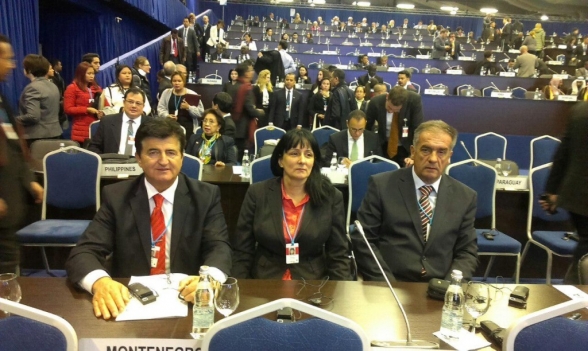At the beginning of the Conference in which 177 states participated, and which was held inSaint Petersburg, the participants were welcomed by the Chair of the Fifth session of the Conference of the States Parties to the United Nations Convention against Corruption. She thanked the Secretariat of the Conference and working groups for their cooperation, which was then followed by the election of new member chairs of the session of the Conference. As a rule, the Chair is a representative of the host state, so the Minister of Justice of the Russian Federation Mr Alexander Konovalov was elected.
The Conference was attended by delegation of Montenegro in the following composition: President of the Council of the Agency for Prevention of Corruption Ms Goranka Vučinić, members Mr Ristan Stijepović and Mr Radule Žurić, and member of the Commission for Prevention of Conflict of Interests Ms Ana Raičević.
At the session, the focus was placed on the completion of the first cycle of the Mechanism for the Review and preparation for the beginning of the second cycle. It was noted that the state policies of States Parties to the UN Convention should be harmonised with the positions of the Convention.
After taking over the chairmanship of the session, the Chair expressed his position on the need for establishing a platform for promotion of fight against corruption. Furthermore, he stressed the need for equality and inclusion of national dialogue, as well as the need for monitoring and strengthening of bilateral and multilateral cooperation and sharing of experiences. He pointed out that the percentage of information received from states had been changing in a positive direction, as well as the percentage of reports of corruption and removal of the administrative barriers.
On days one and two, during the general debate, representatives of a large number of organisations participated in it, including: representative of UNODC, Group 77 from China, African Group, Asian-Pacific Group, Latin America Group, EU, as well as representatives of individual states.
The presenters agreed that the corruption was a phenomenon undermining trust in the institutions, as well as that money laundering was one of barriers in creation of a healthy society. Technical assistance, cooperation among the states, building capacities, legal aid, and primarily transparency, were steps that could lead to effective and efficient suppression of corruption. Furthermore, they viewed that strengthening in part of prevention of conflict of interests and reporting of corruption was needed. They also pointed out that their states had adopted sets of measures for fighting against corruption and that consolidation of best practices and facilitation of the procedure for sharing information were exceptionally significant for fighting and suppressing corruption. The presenters considered that it was necessary to monitor illicit enrichment of public officials, in order to achieve efficient fight against corruption.
On day two of the session, following the end of the general discussion, “Prevention of corruption” was on the agenda, so in that part a large number of states shared their experiences - best practices and barriers encountered in fighting corruption.
On day three of the Conference, “Recovery of assets” was on the agenda, so sharing of experiences in this field among the states, as well as opinions of numerous international organisations which participated in the session, were exceedingly significant for participants of the Conference.
During the first three days, in addition to the plenary session, numerous meetings of working groups were held simultaneously: International Cooperation Expert Meeting; Anti-corruption in Small Island Developing States; Making public procurement public: Public-private cooperation to promote integrity and transparency in the public procurement system; UNODC regional programme for Eastern Africa; Resumed 6th session of the Implementation Review Group; Stolen Asset Recovery Initiative; Effective protection of whistle-blowers, and others.
Following harmonisation of the content of resolutions, it was planned that the next two days should be spent on adoption thereof.








